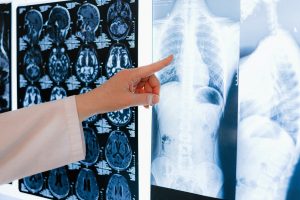When you hear your tummy rumble…
That’s diarrhea…unfortunately…
April is Irritable Bowel Syndrome Awareness Month
And with Irritable Bowel Syndrome (IBS), there’s a lot of new things to become aware about.
For the 12% of Americans suffering with IBS, recurring diarrhea and constipation are no joke. IBS used to be called “spastic colon” or “IBS colitis” and tends to impact more women than men. There are 3 types: IBS-C (constipation), IBS-D (diarrhea), and IBS-M (mixed alternating type). It can be debilitating, with sufferers needing to be aware of restroom locations when they go out, difficulty stooling, nausea, bloating, and stomach or intestinal pain. Despite all of these bowel issues, on exam, the digestive system appears healthy and normal and many patients may be told that there’s no known reason for their gastrointestinal distress. Some are simply handed a medication for constipation or anxiety or depression and sent on their way.
IBS is considered a functional gastrointestinal disorder, implying that there’s a gut-brain connection involved. And the body is wired to have the gut and brain directly talking throughout the day. The “brain in the gut” is called the enteric nervous system, providing a super highway, the vagus nerve, from all of the digestive organs straight to the brain. (My clients hear me talk about their vagus nerves ad nauseam! Pun intended.)

Because the body is wired this way, the gastrointestinal system is highly impacted by stress. And let’s face it. Many Americans are stressed on a good day, running between activities, balancing work and family and finances and life responsibilities, cramming in meals with processed foods in between activities. Stress is often worn as a badge of honor. High stress abounds. But comes at a price: It’s screwing with our digestive systems.
As a result of this constant stress firing along the vagus nerve, ongoing stressors and lifestyle habits can be a driving cause of IBS for many people. For others, food sensitivities or intolerances, poor diet, or dysbiosis of gut bacteria leading to infections may also be contributing to their IBS.
Here are 5 easy fixes that can help resolve IBS symptoms in most people.

- Practice eating hygiene. This means separating meal times from the rest of the day by focusing on eating during meals, sitting at a table, drinking only minimal liquids during meals instead of entire glasses of water, and chewing your food well until it’s like liquid. Just chewing more has fully resolved some of my clients’ gut symptoms! You can read more about this here.
- Eat enough fiber throughout the day to promote better bowel movements. The average American gets about 16 g fiber, while at a minimum, I would recommend at least 28 g per day.
- Cut down on sugar, including from fruits and fruit juices. Remember the prunes and pears you gave your babies when they were constipated? The sugar from the fruit draws water into the colon to support a bowel movement, and for those whose stools already run on the looser side, this can cause diarrhea.
- Manage stress. Let’s face it, we all have stress. It’s not going anywhere. But when we’re experiencing our stress, the last thing the body wants to deal with is digesting food. It’s in a fight for its life! Higher stress states can cause rapid movement through the bowel, causing diarrhea.
- Use a high quality, broad spectrum probiotic that contains a mix of Lactobacillus and Bifidobacteria strains. Certain strains of Lactobacillus can be helpful with diarrhea, while certain Bifido strains can be more useful for constipation; this is where experimentation or a professional consult may be helpful to figure out what your body uniquely needs.
For some people, while these foundational steps are critical, they won’t fully resolve symptoms. This tells us that we still need to explore other avenues, including identifying food sensitivities and other triggers, working on reducing the body’s fight/flight response, mapping out the gut bacteria, and rebalancing the gut where appropriate.
Interested in receiving support for your IBS? We can help find you answers!
References
Johns Hopkins Medicine. (2021). The Brain-Gut Connection. Retrieved from https://www.hopkinsmedicine.org/health/wellness-and-prevention/the-brain-gut-connection
NHANES. (2014). Fiber intake of the US population. Retrieved from https://www.ars.usda.gov/ARSUserFiles/80400530/pdf/DBrief/12_fiber_intake_0910.pdf
NIH. (2021). Definition & facts for Irritable Bowel Syndrome. Retrieved from https://www.niddk.nih.gov/health-information/digestive-diseases/irritable-bowel-syndrome/definition-facts
